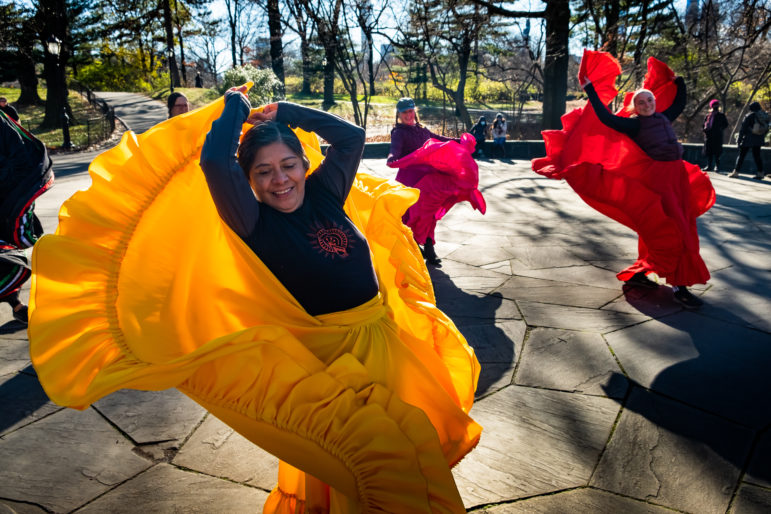“If the city is to remain a global leader in arts and culture, it must rethink its approach to helping cultural organizations and creative businesses thrive.”
Adi Talwar
Performers in the Mazarte Dance Company practice their routine in Central Park in December 2020.
CityViews are readers’ opinions, not those of City Limits. Add your voice today!
No matter where you live in New York City, you’ve had some version of this experience: a beloved institution—whether it’s a locally owned theater, cafe, dance studio, gallery, book store, or any number of community spaces—suddenly doesn’t open one day.
Next, furniture appears on the curb, or maybe a GoFundMe is launched to make up for back rent. All too often, this is the start of a process that means a New York neighborhood risks losing another irreplaceable space.
Even before the pandemic, many of our city’s smaller cultural organizations and creative businesses were struggling to remain in neighborhoods where they had been a part of the fabric for decades. Live performance venues and movie theaters were experiencing seismic shifts in audience behavior, and rising rents were threatening groups of all sorts.
The pandemic’s disruption further illuminated and exacerbated the sector’s greatest challenges: affordability, the complexity of navigating government aid programs, and the difficulty of accessing technical assistance tailored to their unique needs.
Small and mid-sized organizations bore the brunt of the damage. These groups, which often provide the most diverse, experimental programming and serve as community anchors, lacked the financial cushions of larger institutions. While the cultural sector displayed a remarkable resiliency, the pandemic laid bare just how fragile our cultural and creative ecosystem truly is.
If the city is to remain a global leader in arts and culture, it must rethink its approach to helping cultural organizations and creative businesses thrive. That’s why we’re launching NYC Create in Place, a new city initiative to support these vital, local institutions that are so important to New York City’s vibrancy, social strength, and unique sense of place.
In 2023, a delegation of city officials traveled to London as part of the World Cities Culture Forum Leadership Exchange Program with support from Bloomberg Philanthropies. The purpose of the exchange was to study London’s Culture at Risk Office, which was established in 2016 to help safeguard cultural spaces that were at risk of closing, often due to similar challenges we were seeing in New York. The London office had notable success—helping to preserve an LGBTQ+ club and community space, assisting historic local pubs, and supporting theaters and art spaces rooted in the city’s communities of color.
NYC Create in Place offers a comprehensive framework that integrates resources, services, and expertise into one accessible package to ensure that existing and future creative entities have access to the tools they need to maintain the space they need for creation, performance, and community gathering.
Drawing on London’s framework, the initiative builds on the mayor’s commitment to streamline government processes, break down silos between government agencies, and strengthen support for small businesses and nonprofit organizations.
A key aspect of this framework is the creation of a centralized, cataloged resource hub, allowing cultural organizations to easily access the funding, technical assistance, and space they need to survive and grow. Inter-agency coordination is essential, ensuring that various city departments—from economic development to planning—work together to protect and promote cultural assets.
Direct consultations can help organizations more quickly identify resources and connect with partners who understand the unique challenges of operating creative workspaces. We are also seeking to establish a space network that connects creative entities with affordable workspace, rehearsal spaces, and performance venues. In addition to looking to save brick and mortar locations, Create in Place wants to preserve the soul of these spaces—what makes them essential to their communities.
While having conversations and working with the creative community to develop this initiative, we’ve already seen the great demand for this work. When Bushwick Starr was opening their permanent, new home this fall, we helped accelerate the process to get the permits for their premier in the new space. Working with partners at Small Business Services and the Department of Citywide Administrative Services, we helped place Art on the Avenue in a vacant storefront, activating the underutilized space while giving artists much-needed affordable workspace. We enrolled New Federal Theater in a new Department of Cultural Affairs initiative to support smaller groups considering transformative capital projects.
Across the city, New Yorkers band together to save the things that matter to them most. Now, we are eager to tap into this energy and give communities the tools they need to do this work in an intentional, equitable way.
Protecting and investing in our creative sector is an economic and social imperative. The creative industries contribute an estimated $110 billion to the city’s economy each year and provide tens of thousands of jobs. The arts are crucial to the city’s vibrancy, serving as a platform for diverse voices and contributing to our social well-being.
NYC Create in Place is an important step to provide the resources, tools, and support necessary for these organizations to thrive, especially in the face of an unpredictable future. By doing so, we’re not only working to secure its future as a global hub for innovation and cultural exchange— we’re working to protect the creative soul of New York City.
Anne del Castillo is a senior policy advisor for creative sector strategy at the NYC Department of Cultural Affairs. B.J. Jones is the executive director of “New” New York.
The post Opinion: NYC Create in Place & Safeguarding Our Creative Capital appeared first on City Limits.

